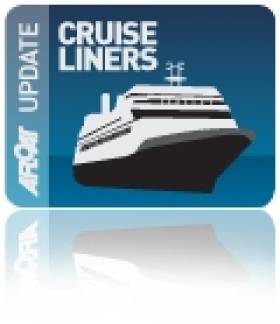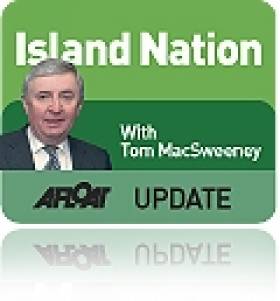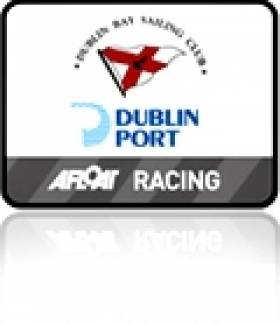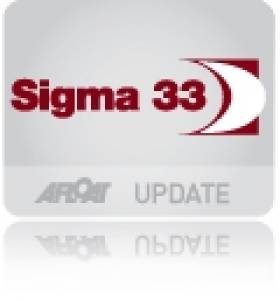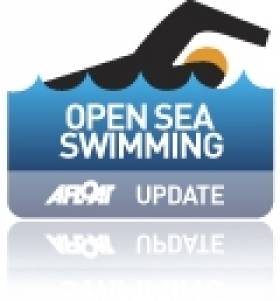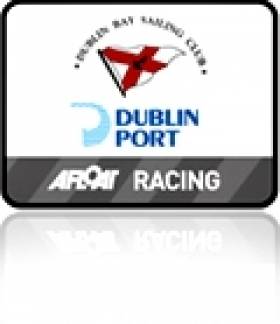Displaying items by tag: Dublin Bay
Jalapeno Wins DBSC Cruisers One Race
BENETEAU 31.7 Echo- 1. Magic (D.O'Sullivan/D.Espey), 2. Violet Flame (B.Murphy/L.Osbourne), 3. Prospect (Chris Johnston)
BENETEAU 31.7 - 1. Magic (D.O'Sullivan/D.Espey), 2. Violet Flame (B.Murphy/L.Osbourne), 3. Prospect (Chris Johnston)
CRUISERS 0 Echo - 1. Lively Lady (Derek Martin), 2. WOW (George Sisk), 3. Tiamat (Tim Costello)
CRUISERS 0 - 1. Lively Lady (Derek Martin), 2. WOW (George Sisk), 3. Tiamat (Tim Costello)
CRUISERS 1 - 1. Jalapeno (Dermod Baker et al), 2. Jura (Barry McCabe), 3. Jetstream (Peter Redden)
CRUISERS 1 Echo - 1. Jura (Barry McCabe), 2. Adrenalin (Joe McDonald), 3. Gringo (Tony Fox)
CRUISERS 2 Echo - 1. Dick Dastardly (B.Cusack et al), 2. Bendemeer (Gerald Kinsella), 3. Red Rhum (J Nicholson)
CRUISERS 2 - 1. Dick Dastardly (B.Cusack et al), 2. Jawesome 11 (V.Kennedy/M.Dyke), 3. Red Rhum (J Nicholson)
CRUISERS 3 Echo - 1. Carrabeg (D.Martin/R.Deasy)
CRUISERS 4 - 1. Maranda (Myles Kelly), 2. Ghrazel (Charles Pearson), 3. Rascal (K.Burke/S.Milner)
FLYING FIFTEEN Race 1- 1. Hy5ive (D & S Gorman), 2. Kooigjug (K Dumpleton), 3. Fifty Somethings (David Mulvin)
FLYING FIFTEEN Race 2- 1. Out of the Blue (F.Mitchell/G Grier), 2. Gulfstream (A.Cooper), 3. Hy5ive (D & S Gorman)
IDRA 14 FOOT Race 1- 1. Doody (J.Fitzgerald/J.Byrne)
IDRA 14 FOOT Race 2- 1. Dunmoanin (Frank Hamilton), 2. Doody (J.Fitzgerald/J.Byrne), 3. Sapphire (Lorcan O'Sullivan)
MERMAID Race 2- 1. Jill (P.Smith/P.Mangan), 2. Oonagh (J&M Griffith), 3. Aideen (B.Martin/D.Brennan)
MERMAID Race 1- 1. Oonagh (J&M Griffith), 2. Jill (P.Smith/P.Mangan), 3. Kim (D Cassidy)
RUFFIAN 23 - 1. Ruff N Ready (Ann Kirwan et al), 2. Ruffles (Michael Cutliffe), 3. Alias (D.Meeke/M.McCarthy)
SHIPMAN - 1. Euphanzel lll (Louis McSherry et al), 2. Jo Slim (J.Clarke et al), 3. Macro One (Joseph Murray)
SIGMA 33 - 1. White Mischief (Timothy Goodbody), 2. Rupert (R.Lovegrove/P.Varian), 3. Popje (Ted McCourt)
SQUIB Race 1- 1. Perfection (Jill Fleming), 2. Anemos (Pete & Ann Evans), 3. Lola (Frank Whelan)
SQUIB Race 2- 1. Perfection (Jill Fleming), 2. Lola (Frank Whelan), 3. Anemos (Pete & Ann Evans)
WHITE SAIL CRUISERS Echo - 1. Finnegans Wake (T.Rowlands et al), 2. Coumeenole (Bill Kavanagh), 3. Just Jasmin (Philip Smith)
WHITE SAIL CRUISERS - 1. Act Two (Michael O'Leary et al), 2. Arwen (Philip O'Dwyer), 3. Calypso (Howard Knott)
Largest Ever Cruiseship to Dublin Set to Return
During the summer the 290m vessel called to the capital as did one of her sisterships, the slightly smaller Emerald Princes. The 2006 built Italian Crown Princess presented a most impressive sight while in the port but equally when departing in the bay on 13 August at the start of a short leisurely overnight passage to Liverpool.
Crown Princess represents one of several 'Grand'-class generation vessels built for Princess Cruises, a subsidiary of the US-owned cruise clongomerate, Carnival Cruise Corporation, based in Miami. The leadship of the class, Grand Princess made the first cruise-call to Dublin in August 2004.
On that occasion, Grand Princess was the largest cruiseship to dock in Dublin, breaking all records when surpassing the milestone 100,000gt mark. The vessel moored unsually at the Coal Quay, a berth normally reserved for ships trading in scrap-metal. Since then the Grand-class sisters berth in a more central location within the port at Alexandra Basin.
Privatisation of the Ports Should be Strongly Opposed
In the first installment of a new weekly maritime blog on Afloat.ie, marine correspondent Tom MacSweeney says our ports are vital national assets;
It astonishes me that the Government should consider selling off the country’s ten major port companies - Dublin, Cork, Dun Laoghaire, Waterford, Shannon/Foynes, Drogheda, Galway, Wicklow, New Ross and Dundalk.
Ninety-five per cent of Irish exports and imports go by sea through our ports which are the vital entry and exit points of our transport system. To consider privatising them is an example of how unaware the Government is that Ireland is a small island community on the periphery of Europe.
The lesson of transport chaos caused by the Icelandic ash grounding aircraft this year has not been learned. It demonstrated how vital maritime transport is to this island nation.
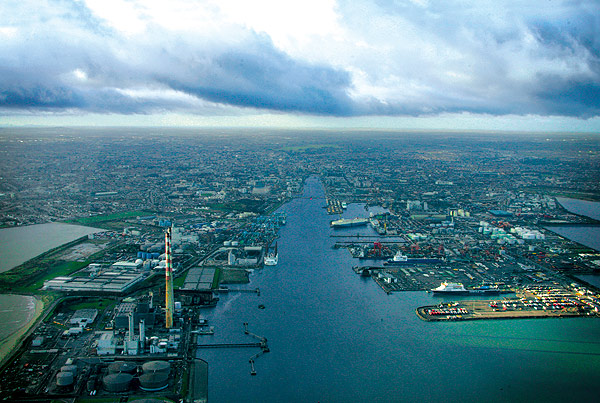
Dublin Port Company - a profitable state company
This is a smash-and-grab raid, redolent of a bankrupt Government philosophy. It is one thing to consider selling off the family jewels when, at least, the householder would still have access to the house. To sell off the ports is akin to the householder selling off the driveway, porch and front door to the house, then having to pay for the right to use them to enter the house in the future.
The Government has failed to develop a national ports policy. In the Progressive Democrat-fuelled era when privatisation, competition and profits were its driving force, the ports were moved out of direct State ownership and turned into semi-State competing bodies. Iarnrod Eireann was permitted to largely opt out of rail freight operations through the ports. Turned loose to compete against each other, the port companies followed no overall national policy for the benefit of the nation and now their future has been put in the hands of a group whose chairman advocates the sale of State companies and has already shown a lack of concern for the marine sector by shutting down the national sail training programme.
Aspects of journalism these days disappoint me after 45 years in the profession. Colm McCarthy who led Bord Snip Nua, is now chairing what is, effectively, ‘board privatisation,’ yet sections of the media seem largely to accept his views without question. I have not seen a lot of reportage which refers to his scathing opposition to the building of the DART, the Dublin Area Rapid Transport system, which he described as financial insanity and profligacy. Had those views been accepted, there would be no DART in Dublin, the consequences of which today are interesting to consider.
Privatisation of the ports should be strongly opposed. These are vital national assets. The lesson of selling-off Eircom has also, apparently, been forgotten by the Government.
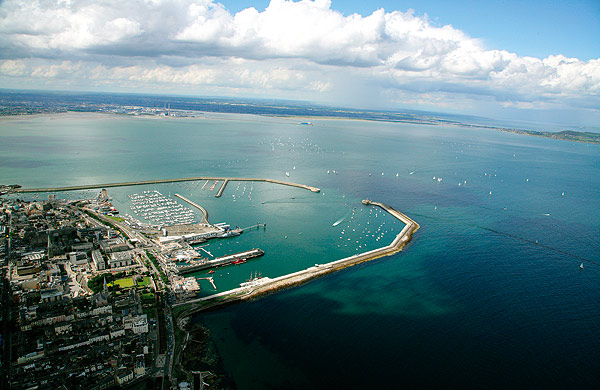
Dun Laoghaire Port on Dublin Bay
A Republic should be an entity in which there is open debate about public policy, not decision-making by elites. Flogging off our best assets, which is what this move by the Government is about, will not solve the nation’s problems. It is shocking to think that money from the sale of our vital transport arteries, the ports, could go to benefit those property speculators and banks which have bankrupted this nation.
This article is reprinted by permission of the CORK EVENING ECHO in which Tom MacSweeney writes maritime columns twice weekly. Evening Echo website: www.eecho.ie
Big ISORA Fleet Gathers for M2 Buoy Race
- Dinah
- Dublin Bay
- Just Enough
- Lula Belle
- ISORA
- National YC
- irish sea
- English Mick
- Quite Correct
- Galileo
- African Challenge
- Lancastrian
- Tsunami
- Rebellion
- Orna
- Madam Wen
- Rollercoaster
- Raging Bull
- Miss Scarlett
- Team Windmill
- First of September
- Finnigans Wake
- Windshift
- Mojito
- Adelie
- Gwawr
- Yahtzee
- Legally Blonde
- Katanca
- Oystercatcher
- Obsession
- Sarnia
Sailing Mourns Loss of Two Stalwarts
DBSC Racing Cancelled Due to Poor Visibility
Dublin Bay Sailing Club (DBSC) was cancelled tonight due to poor visibility on Dublin Bay.
The fifth 'Nora Barnacle Challenge' Sets Sail this Friday
The fifth "Nora Barnacle Challenge" takes place this year on Friday 20th August 2010 at 4p.m. in Dublin Bay. The event is a charity yacht race sailed in 11 Sigma 33 boats. The purpose of the race is to raise funds for the Blackrock Hospice. The event is run by 3 Sigma 33 sailors, Bobby Kerr, Paul McCarthy and Maurice Byrne - in association with their local pub "Fitzgerald's of Sandycove". The idea is to provide an opportunity to non-sailors to participate in a short race from Dun Laoghaire to Dalkey and back with the assistance of two experienced sailors.
This year it is expected that there will be over 100 participants sailing on the water. All the proceeds raised for the event are donated to the Blackrock Hospice charity to provide funding for much needed equipment. This event brings together the Sigma 33 sailors in Dun Laoghaire , the traders of Sandycove and Glasthule and the 100 plus participants who together provide the sponsorship and donations for this deserving charity.
This is the fifth year of the event and it is hoped that by Friday evening the group will have raised €75,000 since 2006 for the Hospice through donations and sponsorship raised by participants.
The Nora Barnacle challenge started in 2006 when three local sigma 33 sailors were challenged by the local cliental of Fitzgerald's pub in Sandycove, to settle a score "who was the best sigma sailor in the establishment". The challenge was accepted and the event was organised by the three sailors, Bobby Kerr of "Leeuwin", Paul McCarthy of "White Mischief" and Maurice Byrne of "Miss Behavin". To ensure fair play and that no one boat would have a competitive advantage the rules of the event stated that five members of the crew of each boat would be made up from people with no sailing experience, along with two experienced sailors and that the race would be used as an opportunity to raise sponsorship in aid of the designated charity, the Blackrock Hospice.
In keeping with tradition, all participants, spectators and supporters will retire to Fitzgerald's pub in Sandycove for refreshments and the official prize giving of "The Nora Barnacle Cup" presented by Tom Fitzgerald followed by the annual auction to raise additional funds. The official " Nora Barnacle Challenge" T-Shirt will also be on sale.
Dalkey Island Swim Raises funds for African hospital
This year's charity swim across the sound from Dalkey Island to Coliemore Harbour took place on Sunday 15 August writes Jehan Ashmore.
The event raised a total of €5,000 with the proceeds benefitting the Kisiizi Hospital in south-western Uganda. The padraetric hospital is planning to install a new theatre.
During glorious summer sunshine, around twenty participants swam the sound with RIB-boat tenders from the Royal St. George Yacht Club (RSGYC) in attendence and also keeping a viligant eye was Dun Laoghaire's new RNLI inshore lifeboat, Realt Na Mara (D-731), a type IBI-1 craft. The event is held every August on a Sunday with swimmers paying a pre-registration fee as part of the fund-raising effort.
For several years, Kisiizi hospital has received the support of the organisers of the charity swim and assistance from St. Pauls Church, Glenageary. For further information on the fundraising swim; contact Peter Craven (01) 2855543
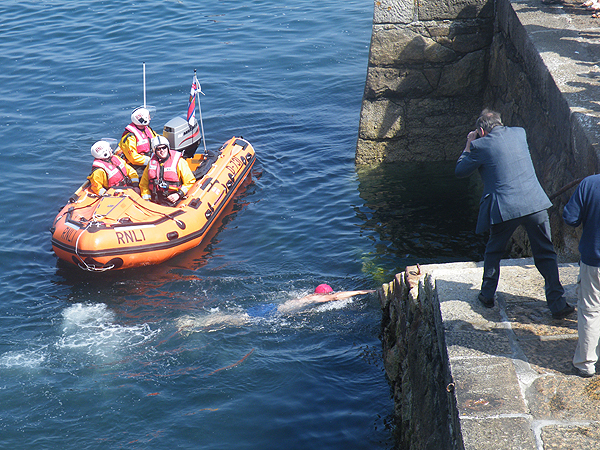
Cor Baby Beats Borraine in Cruisers Two Dublin Bay Race
CRUISERS 1 - 1. Indecision (Declan Hayes et al), 2. Powder Monkey (C.Moore/M.Byrne), 3. Something Else (J.Hall et al)
CRUISERS 2 - 1. Cor Baby (Keith Kiernan et al), 2. Borraine (Ean Pugh), 3. Red Rhum (J Nicholson)
CRUISERS 3 - 1. Wynward (Wyn McCormack), 2. Chouskikou (R.Sheehan/R.Hickey), 3. Pamafe (Michael Costello)
CRUISERS 4 - 1. Maranda (Myles Kelly), 2. Aslana (J.Martin/B.Mulkeen), 3. Artemis (J.Giles)
FIREBALL - 1. Blind Squirrel (Frank Miller), 2. Goodness Gracious (Louise McKenna), 3. Elevation (N.Colin/M.Casey)
GLEN - 1. Pterodactyl (R & D McCaffrey), 2. Glenluce (D & R O'Connor), 3. Glenmarissa (F.Elmes/W.Higgins)
IDRA 14 FOOT - 1. Dart (Pierre Long), 2. Doody (J.Fitzgerald/J.Byrne), 3. Dunmoanin (Frank Hamilton)
MERMAID - 1. Jill (P.Smith/P.Mangan), 2. Kim (D Cassidy), 3. Oonagh (J&M Griffith)
PY CLASS - 1. Evan Dolan (), 2. Ross O'Leary (Laser), 3. Brian O'Hare (Laser 1)
RUFFIAN 23 - 1. Diane ll (Bruce Carswell), 2. Alias (D.Meeke/M.McCarthy), 3. The Sting (Richard O'Keefe et al)
SIGMA 33 - 1. Pippa lV (G.Kinsman/K.Blake/M.O'Brien), 2. White Mischief (Timothy Goodbody), 3. September Song (Conor Colleary)
25 Entries for ISORA's M2 Buoy Race
25 sailing boats are entered for this Saturday's Dun Laoghaire – ODAS M2 Buoy – Dun Laoghaire race starting at 10 am. This is the eighth race of the ISORA series and it is organised in conjunction with the Royal Alfred Yacht Club. The start line will be located in Scotsman's Bay in the vicinity of DBSC 'Pier' mark between the mast of a committee boat flying the RAYC burgee and a start mark at the port end. An entry list and sailing instructions are attached.




























